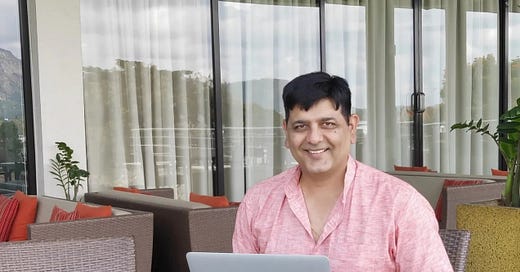🍀EMOTIONAL DYNAMISM - Issue 212
Hi, I am JOE and I write on "Mindful Productivity & Cerebral Happiness". My endeavour is to share life lessons, some thoughts, quotes & links to articles/podcasts/books, I discover during the week.
Hey Friends, if you’ve not subscribed till now and want to become a patron of this newsletter then you can do right away before diving into this week’s ‘SUNDAY REATZO’.
This week I thought of writing on a topic which is very much relevant in rapidly changing time. You can straight way dive into 🗞️ it and find your takeaways ;
Good leadership practices are always pivotal to every progression. But, in today's unstable and multipolar world, it demand even higher competency from the people who find themselves in positions to lead the people or organisations.
In this race of becoming better at leadership practices, Emotional Intelligence (EI) has joined IQ ( Intelligence Quotient) as one of the mark to define a well-rounded leader. While there are many measures of emotional intelligence as behaviour, cognitive ability, part of one’s personality, or self competence. These are some of the concepts that appear frequently in many literatures. However, broadly speaking;
EI means : self-awareness, self-regulation, empathy, and social skills.
EI has been associated with transformational leadership capacities such as inspiration, motivation, and vision. Studies have suggested that higher levels of EI are associated with higher ratings of leader’s performance on their effectiveness by the followers.
The aim of this week newsletter is to provide a framework for how one might develop emotional intelligence through the characteristic that I call Emotional Dynamism.
1. Emotional Dynamism is the extent to which one can access a full range of emotions, modulate the intensity of any one emotion, move through emotional states smoothly and quickly, and integrate one’s emotional state with what one is thinking, one’s physical state, and one’s creative capacity. Primarily there are four dimensions of Emotional Dynamism :
Emotional range,
Emotional intensity,
Emotional fluidity, and
Emotional integration.
Some of us have an impoverished understanding of the range of human emotions. We understand mad, sad, and happy and are perhaps only species able to report and feel comfortable with those basic emotions. However, as our emotional sophistication grows, we can cover a wider range.
Emotionally dynamic leader can access hundreds of emotions beyond the six primary emotions of happiness, sadness, fear, anger, surprise and disgust.
Among many Range of Leadership Emotions, compassion and empathy require that we identify with the emotions of others. If we are uncomfortable with particular emotions, we tend to avoid or deny them in ourselves, thus denying access to important information about the particular set of events, circumstances, or people that gave rise to those emotions. In addition, we cannot identify with or may seek to avoid emotions in others that we are not comfortable acknowledging within ourselves.
It is difficult to be compassionate or have empathy if we cannot “see” certain emotions.
How to Develop Emotional Range
3. One of the frequent reasons for lack of emotional range is that we are consciously or unconsciously avoiding particular emotions. Therefore, a development activity would be to understand the basis for your avoidance. Ask these Questions:-
Are there situations in which you experienced an undesirable outcome when you expressed a particular emotion?
Do any of the cultures that influence you (national, gender, family, professional) have sanctions against expressing particular emotions?
Another avenue of development is to explore and evoke unfamiliar emotions. We can train ourselves to recognize subtle emotions by careful observation.
Let’s Turn the Lens on You
Just Ask these Questions for Your Self-Assessment :
Which emotions are easiest for me to accept in myself and others? Make a list.
When have I received feedback about my empathy or lack thereof?
What needs do I have that are being fulfilled or frustrated?
How do those needs relate to my emotional range?
Take good care & hope you have enjoyed reading this week's dose of ‘Mindful Productivity & Cerebral Happiness’.
Joe
❤️ 🧠 Few things in which I stayed invested during the week🧤🧤
ARTICLE/BLOG POST -
➡️ Why learning to apologise can save your relationship.
🧠Book, I’m Currently Reading:-📖📚⬇️
Voice for the Voiceless - By Dalai Lama
📺 What I’m Currently Watching:
“THE HEART KNOWS” on NETFLIX
Do Join 1000+ Retazoians! for ‘Mindful Updates & Life Skills’
Do follow the ‘JOE’s Life Skills Lab‘ and get yourself enrolled in my E-Mail Newsletter ( Click Here) “SUNDAY RETAZOS” sent exclusively to my subscribers with weekly updates on Mindful Productivity, life lessons and interesting articles, I discover during the Week. I AM SURE YOU DO NOT LIKE TO MISS OUT ON THIS ( Click here to enrol yourself 👆)
🖇️🔗💌👉 Get in touch…—🔜 ⤵️ JOE’s LIFE SKILLS LAB/Joe Sehrawat ( Click Here ☝️)



